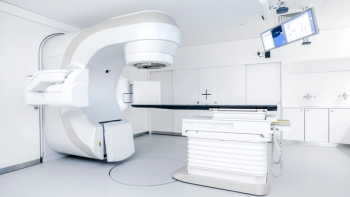
On-pathway regimens are associated with lower costs, and slightly higher emergency department visits and adverse event rates in cancer care.

On-pathway regimens are associated with lower costs, and slightly higher emergency department visits and adverse event rates in cancer care.

The rate of pathologic complete responses with enfortumab vedotin was 36.4% among patients with muscle-invasive bladder.

Pirtobrutinib was associated with a 19.6-month median progression-free survival in patients with heavily pretreated chronic lymphocytic leukemia and small lymphocytic lymphoma.

The complete response or complete response with incomplete bone marrow recovery rate was 61% for patients with chronic lymphocytic leukemia and high-risk disease.

Experts share insights on standard work-up and staging practices for a patient with newly diagnosed bladder cancer.

Expert panelists unpack a patient's bladder cancer presentation, evaluating the presence of typical signs and symptoms that could lead to a diagnosis.

The FDA has granted priority review to the biologics license application for zolbetuximab as a treatment for patients with locally advanced unresectable or metastatic HER2-negative gastric or gastroesophageal junction adenocarcinoma.

Among patients with lung oligometastases, no significant differences in overall or disease-free survival were observed with single- and multi-fraction stereotactic ablative body radiotherapy.

A prostate stem cell antigen-directed CAR T-cell therapy agent showed preliminary efficacy in patients with metastatic castration-resistant prostate cancer.

The National Comprehensive Cancer Network has updated their guidelines on high-dose methotrexate and glucarpidase.

Arletta Jackson, RN, MSN, explains the concept of patient-centric infusion and how it benefits both nurses and patients.

The median overall survival with intra-arterial gemcitabine was 15.7 months vs 10.1 months with intravenous gemcitabine and nab-paclitaxel.

Manufacturers are pulling the pralsetinib indication for patients with medullary thyroid cancer. It is still under investigation as a treatment option for patients with non–small cell lung cancer.

Patients with advanced urothelial carcinoma who received avelumab reported any-grade treatment-related adverse events at a rate of 78.2%.

Patients with Waldenström macroglobulinemia who were refractory to a BTK inhibitor achieved preliminary responses with the CD20-targeted CAR T-cell therapy MB-106.

The FDA has launched a priority review of capivasertib and fulvestrant based on data from the phase 3 CAPItello-291 trial.

A new rule seeks to tackle plan member complaints.

Jaktinib is a novel JAK and AVCR1 inhibitor that showed activity in patients with myelofibrosis who were intolerant to or progressed on ruxolitinib.

The FDA has launched a priority review of lifileucel based on data from the phase 2 C-144-01 trial.

Lindsey Lyle, PA-C, MS, discusses how oncology nurses can work with their patients to determine if symptoms are related to their myeloproliferative neoplasm or another health condition.

Each month, Oncology Nursing News® takes a look back at our most popular stories.

Sarah Low RN, MSN, OCN, CMSRN; and Claudia Maldonado-Howell, RN, MSN, FNP, BS, CMSRN, highlight the importance of improving inpatient ambulation for transplant patients.

Tucatinib was first approved by the FDA for the treatment of patients with HER2-positive advanced unresectable or metastatic breast cancer in combination with trastuzumab and capecitabine on April 17, 2020.

For patients with myelofibrosis receiving pacritinib, spleen volume reduction was associated with improved overall survival.

Routine surface wipe testing helps identify specific areas of hazardous drug contamination and guide nurse leaders towards establishing improved protocols.

Mitazalimab and modified FOLFIRINOX produced a 57% objective response rate among patients with metastatic pancreatic ductal adenocarcinoma in the frontline setting.

Darcy Burbage, DNP, RN, AOCN, CBCN, shares which presentations from the 2023 ASCO Annual Meeting she found most important for oncology nurses.

Patients with breast and gastrointestinal cancers reported fewer hand-foot syndrome events following treatment with topical diclofenac gel.

Natasha Kormanik MSN, CRNP, FNP-BC, OCN, discusses accelerated vs regular approvals in hematologic oncology and how it applies to approved PI3K inhibitors.